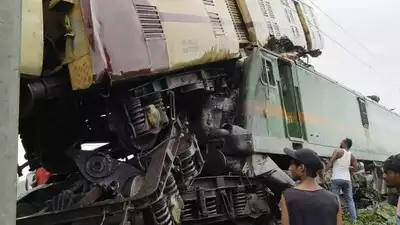Following the devastating Kanchenjunga train accident, the railway board has attributed the cause to the freight train’s loco pilot. The board reported that after obtaining the TA 912 authority pass from Rangapani station, the pilot operated the freight train at a speed exceeding the prescribed limit amid a signal fault, leading to the collision.
The All India Running Loco Staff Association highlighted that trains operate using the alternative form TA 912 during signal failures. Regulations dictate that no train should proceed from a station until the train ahead has crossed the next station. At Rangapani station, the station master issued the TA 912 paper to the freight train only 15 minutes after the Kanchenjunga Express had passed, even though the express train was still on the track a few kilometers ahead. This procedural error warrants investigation as well.

It was also revealed that the loco pilot being held responsible had not slept for four consecutive nights, violating the rule that limits night duty to a maximum of two successive nights. Furthermore, staff in the North-East Zone reportedly lack adequate training for handling trains during signal failures. At the time of the accident, the freight train traveled 78 km per hour.
In the past, pilots have often been blamed prematurely, as seen in the Coromandel train incident. Initial accusations against the pilots were debunked by an investigation that found their phones had been off two hours before the accident.
Janak Garg, Chief Safety Commissioner of Northeast Frontier Railway, confirmed that a preliminary examination showed the freight train’s speed was 78 km per hour at the time of the collision. The death toll has risen to 10 after the passing of six-year-old Sneha, who was injured in the incident on June 18.
A woman passenger, Chinmoy Majmudar, who was injured in the accident, has filed a complaint against both freight train drivers. Majmudar stated that she saw the freight train crash into the Kanchenjunga Express from behind, severely damaging the freight train’s engine. She attributed the accident to negligence by the freight train crew.
The North-East Frontier Railway has scheduled an inquiry for June 19 to determine the cause of the accident. Chief Commissioner of Railway Safety Janak Garg will lead the inquiry, and relevant evidence and witnesses will be summoned. The accident has led to the cancellation of seven trains and the diversion of 37 others.
Despite continuous rain since the night of June 17, NFR DRM Surendra Kumar reported that about 90% of the work to restore the line had been completed. The Kanchenjunga Express, struck from behind by a freight train on June 17 at 8:55 am in Darjeeling, West Bengal, reached Sealdah on June 18 at 3:15 pm.
The automatic signaling system between Ranipatra railway station and Chhatar Haat junction malfunctioned at 5:50 am on the day of the accident. The Kanchenjunga Express departed Rangapani station at 8:27 am and halted between Ranipatra and Chhatar Haat. With the TA-912 Retain Authority, drivers can cross all red signals during signal faults. However, whether the freight train was also given TA-912 authorization or if the pilot breached standard protocol remains to be investigated.
Railway Minister Ashwini Vaishnav announced compensation for the victims’ families: Rs. 10 lakh for the deceased, Rs. 2.50 lakh for the seriously injured, and Rs—50 thousand for those with minor injuries. Additionally, the Prime Minister’s Relief Fund will provide Rs. 2 lakh to the families of the deceased and Rs—50 thousand to the injured.
Read Also: Heatwave Claims Over 550 Lives During Hajj Pilgrimage